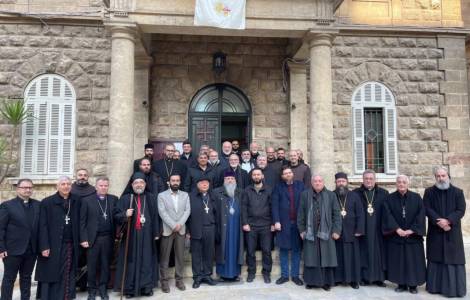
Kantsasar
by Gianni Valente
Aleppo (Agenzia Fides) - On Monday, December 9, the leaders of all the Churches and ecclesial communities present in Aleppo met for the second time with representatives of the armed groups that have taken control of the Syrian city. It was the first meeting after President Bashar al Assad fled and the rebels also took Damascus. "We were all present: bishops, priests and religious," said Jesuit Antoine Audo, Chaldean Bishop of Aleppo, in an interview with Fides. It was a "very positive meeting".
The unprecedented summit took place in the Franciscan church and convent, where the Apostolic Vicariate of the Catholics of the Latin Rite is also located. "Their intention," said Bishop Audo, "seems to be to build trust." Expectations are good, especially considering that "we have reached a dead end: there is no electricity, everything is expensive, many people have difficulty feeding themselves."
At the moment, says Audo, the new forces that dominate the scene, of Islamist origin, show no desire to change or regulate the ordinary life of the ecclesial communities: "On the contrary, they are trying to build trust by respecting our traditions and our prayers. I told them that we, as Arab Christians, represent a unique reality in history and in the world. I recalled some examples of the history of Muslim Arabs with Christians and the contribution of Christians to this history. I added that the status of the "dhimmi" (non-Muslim members of a state guided by Islamic law, ed.) can be interpreted both negatively and positively, that Christians cannot be second-class citizens and that we must work together. They seemed very interested in these considerations."
During the meeting, the representatives of the Christian communities were assured that there would be no changes to the rules for the schools of the ecclesiastical communities, where boys and girls study together in mixed classes. "They have asked all the public officials," continued the Chaldean bishop, "to return to their duties and they have said that the military service that has lasted all these years has ended."
According to Bishop Audo, who is known for his sharp analysis of political contexts and processes, "there was an agreed international decision to secure this way out for Syria. It was not possible to continue in the impasse that had been reached." A solution that certainly involved Turkey and the United States, "but also Russia and Iran. Russia asked Assad to leave the country," and thus "further bloodshed was avoided." Now, says Bishop Audo, things are returning to "normality" in Aleppo, which also includes problems of existence and difficulties in obtaining essential goods. There are initiatives in parishes to give people at least one meal. And preparations are being made to celebrate Christmas on a small scale: "Perhaps," says Bishop Audo, "there will be no parades and spectacular moments. But anyone who wants to visit us in our churches and bishoprics during the holidays is mor5e than welcome." (Agenzia Fides, 10/12/2024)
 ASIA/LEBANON - General Abagnara (UNIFIL): “The Pope’s visit confirms us in our peacekeeping mission”
ASIA/LEBANON - General Abagnara (UNIFIL): “The Pope’s visit confirms us in our peacekeeping mission”
 ASIA/VIETNAM - Vietnamese Catholic communities stand alongside women in need to combat mass abortion
ASIA/VIETNAM - Vietnamese Catholic communities stand alongside women in need to combat mass abortion